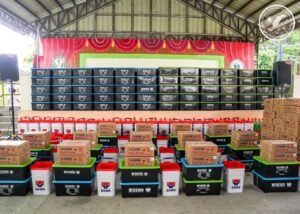During the launch of the Plan & Do (PLANADO) program in Cebu City, President Ferdinand R. Marcos Jr. lauded the Department of Human Settlements and Urban Development (DHSUD) for doing its part in building a resilient Philippines.

He stated that every Filipino family should be provided with respectable, comfortable, and safe living conditions that they rightfully deserve.
PLANADO is DHSUD’s strategic response to the goal of establishing organized and well-planned settlements as envisioned under the Bagong Pilipinas.

𝗕𝘂𝗶𝗹𝗱𝗶𝗻𝗴 𝘀𝘂𝘀𝘁𝗮𝗶𝗻𝗮𝗯𝗹𝗲 𝗰𝗼𝗺𝗺𝘂𝗻𝗶𝘁𝗶𝗲𝘀
DHSUD Central Luzon Regional Director Julius Ervin Enciso highlighted that PLANADO will streamline and digitalize land use and urban planning and development processes to create smart, green, resilient and inclusive human settlements.
“PLANADO is planning for the future. It is planning for the next generation or planning for the programs for a brighter future. PLANADO wants to take care of our environment to lessen the impact of climate change,” he said.
The program underscores the importance of coordinated planning among government agencies, non-government organizations, and other stakeholders to build sustainable and inclusive Filipino communities.
PLANADO is also a big push in the ongoing nationwide implementation of the Pambansang Pabahay para sa Pilipino Housing (4PH) program.
The 4PH is the flagship housing program of the Marcos administration which aims to address the country’s 6.5 million housing backlog.
Through PLANADO, the DHSUD will push for the inventory and mapping of government-owned lands where 4PH housing projects can be built.
𝗔𝗱𝗱𝗿𝗲𝘀𝘀𝗶𝗻𝗴 𝗯𝗮𝗰𝗸𝗹𝗼𝗴
According to DHSUD, Central Luzon’s housing backlog is pegged at 200,772 units.
This figure includes those who are displaced, doubled-up or extended families, homeless, living in informal settlements or danger areas, affected by government infrastructure projects, and living in private properties in threat of eviction or demolition.
Meanwhile, the housing agency currently has a total of 29 4PH project sites in the region which are expected to generate about 126,362 housing units. These will address about 62 percent of the housing backlog.
𝗖𝗼𝗻𝘀𝘁𝗿𝘂𝗰𝘁𝗶𝗼𝗻 𝗶𝘀 𝗼𝗻𝗴𝗼𝗶𝗻𝗴 𝗳𝗼𝗿 𝗳𝗼𝘂𝗿 𝗼𝗳 𝘁𝗵𝗲𝘀𝗲 𝗽𝗿𝗼𝗷𝗲𝗰𝘁𝘀.
These include the Palayan City Township in Barangay Atate, Palayan City, Nueva Ecija; Bocaue Bulacan Manor in barangay Batia, Bocaue, Bulacan; Pandi Terraces in barangay Siling Bata, Pandi, Bulacan; and Crystal Peak Estates in barangay Del Carmen, City of San Fernando, Pampanga.
Seven projects are currently in the ongoingland development process namely those in Sta. Maria, San Rafael, and City of San Jose del Monte in Bulacan; Limay in Bataan; Candaba and Minalin in Pampanga; and General Tinio in Nueva Ecija.
The rest are still in the process of complying with the documentary requirements.
Enciso highlighted that housing projects under the 4PH will provide not just decent housing to all Filipinos, but a holistic community where there are available sources of living to provide comfortable lives for all.
“These will be centered on township development complete with basic facilities such as schools, churches, and markets. These will be habitable, culturally-acceptable, accessible, and affordable for all beneficiaries,” he added.
Most of the projects are in-city resettlements and are vertical housing units.
𝗣𝗿𝗼𝘃𝗶𝗱𝗶𝗻𝗴 𝘀𝗲𝘁𝘁𝗹𝗲𝗺𝗲𝗻𝘁𝘀
Enciso said every Filipino may avail of a housing unit under the 4PH program.
Priority beneficiaries, however, are those coming from the urban poor, informal settler families, minimum wage earners, government employees, and overseas Filipino workers.
Those who are in the informal sectors such as ambulant vendors, tricycle or pedicab drivers, small scale miners, and home-based workers may also avail of the program.
Individuals who wish to apply for a unit should connect to their respective local government units (LGUs) as they are the ones who conduct the selection process.
The LGUs will then provide the list of qualified beneficiaries to Pag-IBIG Fund for evaluation.
As a requirement, applicants should be active Pag-IBIG members with 24-month remittance. Non-members should enroll and pay the amount equivalent to their 24-month contribution.
Also, they should not be more than 65 years old at the date of application, and not more than 70 years old upon loan maturity.
Meanwhile, LGUs who have idle lands suitable for a 4PH project may submit their letter of intent to DHSUD’s email at region3@dhsud.gov.ph or visit its office in the City of San Fernando, Pampanga.
They will need to undergo an orientation, and sign a memorandum of understanding with DHSUD.
Just recently, DHSUD Secretary Jose Rizalino Acuzar instructed key officials to focus on the grassroots level to sustain the positive momentum of the national rollout of the 4PH program. This setup will help address concerns and issues confronting the actual execution of the program on the ground.
To date, a total of 195 LGUs have expressed their intention to participate in the 4PH.
A decent house is a basic need everybody should have. Given this, it is vital that the national government prioritize out-of-the-box and innovative settlement projects like the 4PH to provide shelter for all Filipinos in need. (PIA 3)














